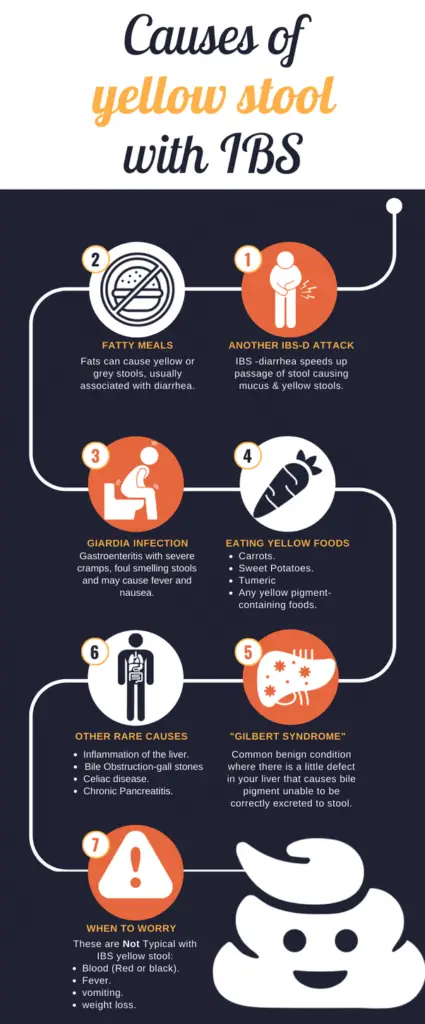IBS Yellow Stool: Is It A Normal Or A Bad Sign?
IBS (irritable bowel syndrome) is often a distressing condition.
In other words:
Whenever you experience abdominal pain, you are afraid that something bigger is happening inside.
The most common causes of IBS yellow stools are yellow foods, IBS-diarrhea flare-ups, gastroenteritis, and stress. Other less common causes, such as liver, pancreas, and gallbladder disease, can result in yellow stool with IBS.
But is it normal to have yellow poop with IBS?
In this article, I will explain to you what are the possible causes, What is common, and what is not?
Also,
When you should worry about your stool and when not to.
As a gastroenterology doctor, I’ve literally dealt with thousands of Irritable bowel syndrome patients, and also, I have irritable bowel syndrome!
As you see, I probably am the right person to hear about irritable bowel syndrome.

The possible conditions Associated with IBS Yellow (pale) stool are:
- IBS-diarrhea flare-up (diarrhea speeds up stool making it yellow or yellowish brown).
- A large fatty meal.
- A new gut infection (such as giardiasis).
- Foods that cause yellow stool with IBS.
- Undiagnosed “Gilbert Syndrome”: a benign condition that causes mild jaundice & yellow stool for years (in about 5%) of people.
- Other diseases that may co-exist with IBS: such as celiac disease, bile acid diarrhea, gallbladder problems, chronic pancreatitis or exocrine pancreatic insufficiency, food intolerances, etc.
- Liver Problems.
- Gallbladder Problems.
- Celiac Disease.
- Pancreatic Problems.
Let’s Begin with the video below from Bright Side. Listen to this section on the yellow stool.
In this article, I will explain the specific causes of IBS yellow stool ordered by the commonest first.
1. You may have another IBS attack (IBS mucus discharge causes pale stool).
We all know that stress and anxiety affect IBS. But can stress cause yellow stool?
YES, it can.
Stress can speed up your digestive process by making your intestine expel its food contents earlier than usual.
This food has no chance of being absorbed, so it causes diarrhea, mucous discharge, and yellow stool with your IBS Attack.
Also, people with IBS are usually intolerant to foods called the FODMAPs (Fermentable Oligo, Di, Monosaccharides, and Polyols). Eating high-FODMAP food often triggers diarrhea in patients with IBS. The FODMAPs that may cause yellow stool and diarrhea with IBS are listed in the table below:
How do you get rid of your stress IBS attack?
1- Eliminate milk & dairy products & Other FODMAPs: milk and dairy products contain a sugar called “Lactose.” Usually, people with IBS have a sensitivity to lactose. So we prefer the temporary elimination of milk products from foods during the attack of IBS yellow stool with diarrhea.
Lactose is present in high concentrations in milk and ice cream and in lesser concentrations in cheese, and yogurt.
So stop drinking milk and eating ice cream during the attack of IBS, even if you hadn’t drunk milk before the attack.
2- Try Easier Foods: that are well tolerated with IBS. Like:
| Water, Ginger Ale, Sprite, and Gatorade. |
| Soy milk or rice milk. |
| Soy or rice-based products. |
| Plain pasta, plain noodles, white rice. No sauces or gravies. |
| Potato: boiled or baked. No French Fries. |
| Bread: French, Italian, whole white, English muffins, and white rolls. |
| Plain fish, plain chicken, plain turkey, or plain ham. |
| Eggs: soft-boiled, poached. |
| Cereals: Plain Cornflakes, Rice Krispies, Corn or Rice Chex, Cheerios; dry or with soymilk or rice milk. |
| Salads: lettuce, hard-boiled egg slices, oil, and vinegar dressing. |
| Cooked peas, and carrots (avoid raw vegetables). |
| Margarine, jams, jellies, peanut butter. |
| In small amounts: applesauce, cantaloupe, watermelon, honeydew melon. |
| In small amounts: fruit cocktail, peaches, pears (canned, non-dietetic). |
Source: UpToDate.com
3- physical exercise
4- try hypnotherapy, yoga, and cognitive-behavioral therapy.
5- consult your doctor.
2. You may have ingested a large fatty meal:
Eating fatty meals is known to worsen irritable bowel syndrome.
Fats can cause yellow (pale) or grey stools, usually associated with diarrhea.
we discussed this topic in-depth here: diarrhea after eating fatty foods: causes and how to deal
As fat needs a longer time to be digested than other food types (proteins and carbohydrates), and hence you have an irritable intestine, the time fat spends at your gut is not enough for its absorption.
So…
As the fat is unabsorbed, it begins to make some troubles like bloating, comics, and yellow or grey stool (Poop) with diarrhea.
Shall you stop eating fat?
The short answer is NO!
You should not completely stop eating fats. You have only to eat less.
Also, you should know that there are two types of fats in food: good fats (unsaturated) and bad fats (saturated).
The bad fats (saturated fats): can affect your blood vessels and your heart causing heart diseases.
They are present in processed junk foods, fast food, and animal protein rich in fats.
You have to minimize the amount you eat from saturated fat.
The good Fats (Unsaturated fats): these fats are protective for your body as they can improve your heart health and reduce inflammation in the body.
Unsaturated fats are present in:
- Seafood.
- Olive oil.
- fish
- Avocado
- Nuts and seeds
They are good for you and can improve your heart health!
An especially important type of unsaturated fat is Omega-3 Fatty Acids. These work within your body to potentially reduce inflammation, and although it isn’t considered an effective remedy for IBS, they may help to improve digestive health.
These good fats should not be reduced. And also, saturated (bad) fats have some benefits, and you should stop eating them completely.
3. You may have Giardia infection, which causes yellow stool with IBS.
Giardiasis is an intestinal tract infection by a microscopic parasite called Giardia. it is acquired by ingesting contaminated food or water.
Giardiasis can cause unusually Yellow stool with IBS; you can differentiate the ordinary IBS attack from giardiasis by the following:
- With Giardiasis, the diarrhea is extremely foul-smelling.
- With Giardiasis, the stomach cramps are more severe.
- With Giardiasis, you may have nausea and low-grade fever.
If you don’t have these signs, you shouldn’t worry about having giardiasis.
But If you have any suspicion of giardia infection, you should consult your doctor.
And don’t worry…
It is a common disease; According to the Centers for Disease Control and Prevention, giardiasis is the most widespread intestinal parasitic infection in the United States.
Usually, your doctor will request a stool analysis and treat you with antibiotics like Metronidazole or Nitazoxanide.
RELATED: YELLOW DIARRHEA: CAUSES SIMPLIFIED BY A GUT DOCTOR.
4. You may be eating foods causing yellow stool.
YES, your Yellow stool with IBS may be simply due to food with yellow color.
Check what you have eaten the last couple of days; if it contained one of the below foods, it might be the cause:
- Carrots.
- Sweet Potatoes.
- Tumeric
- any yellow pigment-containing foods.
So, If you are unsure if your yellow stool is caused by food, you can watch what you eat for the next few days and check your stool color again.
IBS yellow stool caused by food is extremely common and not as rare as you think.
5. If your stool is always yellow for years, You may have a condition called “Gilbert Syndrome.”
Gilbert syndrome is NOT a rare syndrome. It is considered a very common condition that affects 4% to 16% of the whole population of the united states.
This means at least one in every 20 people probably has Gilbert syndrome.
But what is Gilbert syndrome? Is it Dangerous?
Let’s talk about some basic medical facts.
Your stool acquires Its BROWN color because the hemoglobin in your red blood cells is processed and broken down by the liver to a substance called bilirubin.
Bilirubin is further processed in your intestine, giving stool its brown color
In Gilbert syndrome, you have a little defect in your liver that causes this pigment unable to be correctly excreted to stool.
This causes yellow stool, and a yellow pigment is deposited in the whites of your eyes and skin.
But these changes are minor to the degree you may not notice them. It increases with prolonged fasting and with stress.
And OFCOURSE, Gilbert Syndrome is a completely benign condition. That doesn’t require any treatment usually.
What do you have to do if you think you have Gilbert syndrome?
If you have the above symptoms, like yellow whites of eyes, a change in the color of urine (deep orange), and deep stools, you should consult your doctor for proper laboratory tests and diagnosis.
6. Other Uncommon causes of Yellow stool with IBS:
A- Liver Problems:
Rarely, some people may have inflammation of the liver tissue (Hepatitis). Which also hinders bilirubin excretion from the liver to the intestine.
This causes yellow stool with your IBS, and the symptoms are usually severe, like nausea, vomiting, Yellows whites of the eyes, and abdominal pain.
Hepatitis most commonly occurs as an acute condition caused by the Hepatitis A Virus that comes from contaminated foods.
The condition is usually self-limiting with supportive measures like a light diet and plenty of fluids.
B- Gallbladder Problems:
When mechanical obstruction occurs (usually by a gallbladder stone) Obstructing the bile pigment duct.
This will prevent the pigment from reaching your intestine, causing pale or yellow stools.
The condition is usually very obvious with severe symptoms, like severe upper right abdominal pain, nausea, and vomiting.
Also, Jaundice is very noticeable in your eyes, skin, and urine color.
Usually, your main complaint won’t be just the “IBS yellow stool.”
So you DON’T have to worry about these gallstones.
C- Celiac disease:
In this disease, your gut becomes super sensitive to wheat, barley, and rye.
Eating one of these foods can cause severe inflammation in your intestine. And will cause you digestive troubles like abdominal pain, yellow stool diarrhea, or constipation.
Celiac disease may be associated with other symptoms like headaches, depression, and skin rashes.
If you experience any gut problems when eating such foods, you should consult your doctor to make a diagnosis.
D- Pancreatic Problems:
Your Pancreas has a main important function, the secretion of digestive enzymes.
These enzymes help the chemical breakdown of various food particles, thus helping their absorption from the intestine.
When the pancreatic secretions are decreased, the food you will eat won’t be absorbed well.
It is a rare condition, commonly due to chronic inflammation of the pancreas (as in heavy alcoholics) or obstruction of its duct by stone or tumor.
FAQs:
Does IBS cause Yellow Mucus in The stool?
IBS commonly leads to increased mucus amounts in the stool. The mucus in IBS stool is often yellowish or white. Studies estimate that about 50% of IBS patients may have white or yellow mucus in their stool. Mucus in stool with IBS can also result from a new infection, IBD, malabsorption, etc. So, consult your doctor if you have abnormal symptoms such as bloody stools, fever, or any atypical symptoms not consistent with IBS.
Does IBS cause Oily yellow stool?
IBS Stools may be yellowish in color in patients with IBS (especially those with the diarrhea-predominant type. However, Fatty or oily stool is not typical for IBS, and it may be a sign of food intolerance, celiac disease, or pancreatic disease. So, consult your doctor if you consistently experience oily or fatty stools.
What causes Yellow Balls in stool in a patient with IBS?
Yellow balls in the stools of IBS patients are often undigested food particles (such as fruit fibers, seeds, etc.). No need to worry unless you experience atypical symptoms such as black stools, bloody stools, fever, vomiting, etc.
Conclusion:
- Any problem causing speeding up of your intestine movements or decreasing food absorption from the intestine to blood will almost always cause yellow stool.
- If you have a yellow stool with IBS, the most common cause is the IBS attack Itself, especially when you have an IBS-diarrhea type.
- Gut infection (especially with giardiasis) and eating yellow foods are common causes of yellow poop with IBS.
- Other causes are rare and have other symptoms that are more prominent than yellow stool.
Learn more: other causes of watery yellow stools are discussed here.






